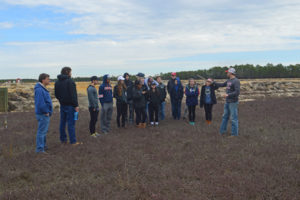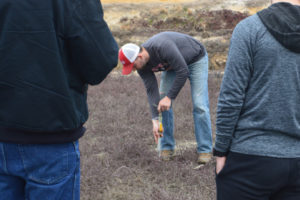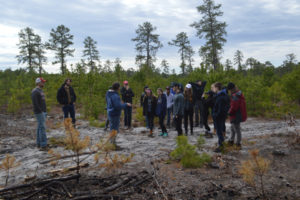Yesterday we had our annual visit from the Moorestown Friends School Intensive Learning Pine Barrens program. From the MFS website:
For one week each March, regular classes are suspended for “Intensive Learning,” when Middle and Upper School students and teachers engage in an in-depth study of a specific subject, often involving off-campus research. This long-standing MFS tradition – which dates to the mid 1970s – allows teachers and students to break out of the structure of formal class periods and traditional study by subject disciplines (math, English, history) for a time of experiential learning in out-of-classroom settings.
The students in the Pine Barrens group spent some time learning about the history of the pines, and finished up their week by coming to visit us and see what people are doing in the present.
Mike Haines and Matt Giberson opened with an overview of Pine Island and our various tasks throughout the year, followed up by the always-lively John Parke, Stewardship Project Director for New Jersey Audubon. Afterward, we took the students out to walk through a young bog and then out to one of our forestry sites.
“I thought the kids asked some great questions,” says Mike. “It was cool this year we were not only able to tell them about our operation, but also they got to hear from John about the quail release project. Cranberry farming is part of the history of the pines as well as a continuing industry, so I really liked being able to add to the breadth of the topics they’ve been covering all week.” Matt agrees: “It was a lot of fun seeing the kids get into the tour this year, especially with John being there. It was a good opportunity to see how Pine Island’s growing season works, but also how our other projects are not only beneficial to our operation but to the community as well.”
“It was an absolute pleasure to present information about the quail translocation project to the students,” says John Parke. “It’s great to see kids getting out to the farm and learning in the field about the importance of agriculture, land management and how it ties to natural resource protection,” Parke added, “because children who are connected to the land and understand value of nature and agriculture, can positively shape the future as good stewards.”



